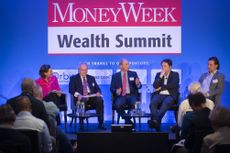Ordinary investors are missing out as private equity takes over
Companies are turning their backs on public stockmarkets and raising more and more money from private equity. Merryn Somerset Webb explains why this is a problem for ordinary investors – and perhaps for capitalism itself.


When Jeff Bezos took Amazon public in 1997, the company was three years old. He needed $50m and the public markets were the only place to get it.
This week, ecommerce firm The Hut Group announced plans to list in the UK. The company is 14 years old and is looking to raise just over $1bn. But the reason for its listing is not raising cash: it has instead been prompted by a “request for liquidity” from backers. Those backers? Private equity features heavily: KKR owns 19% of the business.
These two listings tell the story of the past 20 years. According to a report from Morgan Stanley, companies have raised more money in private markets than public in the US every year since 2009 – Twitter raised $800m privately before listing in 2013, for example. Companies are listing much more rarely and much later – often after their growth years have been financed by private equity. The average age of a 1990s firm at listing in the US was eight years; now it’s 11.
Subscribe to MoneyWeek
Subscribe to MoneyWeek today and get your first six magazine issues absolutely FREE

Sign up to Money Morning
Don't miss the latest investment and personal finances news, market analysis, plus money-saving tips with our free twice-daily newsletter
Don't miss the latest investment and personal finances news, market analysis, plus money-saving tips with our free twice-daily newsletter
Why the rise of private equity matters
It is obvious that this matters. As Duncan Lamont at Schroders, the fund asset manager, says, “public equity markets represent the cheapest and most accessible way savers can participate in the growth of the corporate sector”. If they are allowed to wither, ordinary investors miss out – all the more so given that non-listers are often in high-growth industries. Over time, if the best companies don’t list, returns from public markets are likely to fall. If you had invested $10,000 in Amazon in 1997 you’d have $12m now. Sure, Amazon is an outlier, but small growth companies come with potential for extreme gain. It would be brave to suggest the more mature Hut offers the same. There are implications here for wealth inequality and (if too much growth accrues too obviously off-market to too few) for public acceptance of capitalism.
What has been driving the shift off market? It is partly a matter of companies being reluctant suppliers. The cost of listing has risen hugely since the 1990s. One example: the number of words in the median US annual filing is up to 50,000 from 23,000. So has public scrutiny of executives. It’s not as easy, low cost or indeed as fun as it used to be to run a listed company.
However the real explanation might be not on the supply side but on the demand side. The simplest explanation of the extraordinary shift, says Morgan Stanley is the “demands of institutional investors”. If you run a pension fund you are likely to be fretting about the yawning gap between assets and liabilities. In the US, unfunded pension liabilities could run as high as $6trn. In the UK the Pension Protection Fund notes a total deficit for defined-benefit pension schemes of £200bn.
There are three things managers can do about these horrors. They can pay less out to beneficiaries (no one is keen on this); pay more into the plan (sponsoring companies aren’t keen on this); or try and increase the return on the assets they do have. Everyone likes this option, but that’s not as easy as it was.
Just look at the history of the $350bn held by the California Public Employees’ Retirement System. Until the early 1990s, managers assumed they would hit a rate of return on those assets that was below the yield on US Treasury bonds. That made things easy (buy bonds, go home). By 1992, the assumed return rate was 8.75% and the yield on a 30-year Treasury bond was 7.75%. That wasn’t so easy, but managers only needed to find another 1% a year. Earlier this year, the numbers were 7% and 1.4% respectively. You see the problem. Calpers has no choice – or feels that it has no choice – but to look for higher returns. That might have once meant putting more money in listed equity. It doesn’t any more: GMO forecasts falls of 4%-6% in US equities over the next seven years. That drives managers to private equity.
More is to come
This is not a dynamic that is going to change soon. Private equity resources are at record highs. And there is more coming: one of the world’s largest single investors, California State Teachers’ Retirement System recently raised its allocation to private equity from 9.4% to 13%. Nearly half of institutional investors recently surveyed by BlackRock said they were looking for more private equity. The US has also just made it easier for individuals to invest in private equity via their retirement plans.
Is this a good idea? The jury is out. There is evidence that historical returns have been higher and less volatile in private equity. But the latter trend may simply reflect the fact that private equity managers can use illiquidity to smooth returns, while the former may not survive the rapid growth of the industry – which has bumped up competition for, and prices of, private companies (bubble alert).
Ordinary investors might be tempted to ignore the whole thing and look to make old-fashioned equity returns from newer markets. The number of listed companies may have fallen in the US, UK and Germany, but it has risen significantly elsewhere – in Asian markets for example. Sadly, that won’t be enough. The best companies everywhere will probably remain in private hands for some time. For the world’s investors, the promise of a debt-fuelled something in private equity is better than the certainty of almost nothing elsewhere.
• This article was first published in the Financial Times
Merryn Somerset Webb started her career in Tokyo at public broadcaster NHK before becoming a Japanese equity broker at what was then Warburgs. She went on to work at SBC and UBS without moving from her desk in Kamiyacho (it was the age of mergers).
After five years in Japan she returned to work in the UK at Paribas. This soon became BNP Paribas. Again, no desk move was required. On leaving the City, Merryn helped The Week magazine with its City pages before becoming the launch editor of MoneyWeek in 2000 and taking on columns first in the Sunday Times and then in 2009 in the Financial Times
Twenty years on, MoneyWeek is the best-selling financial magazine in the UK. Merryn was its Editor in Chief until 2022. She is now a senior columnist at Bloomberg and host of the Merryn Talks Money podcast - but still writes for Moneyweek monthly.
Merryn is also is a non executive director of two investment trusts – BlackRock Throgmorton, and the Murray Income Investment Trust.
-
 UK inflation slowed again in March – but a rate cut could be some months away
UK inflation slowed again in March – but a rate cut could be some months awayThe latest Consumer Price Index (CPI) data came in at 3.2% for March, taking us closer to the Bank of England’s 2% inflation target.
By Katie Williams Published
-
 Pension vs property: which option provides the best income for your retirement?
Pension vs property: which option provides the best income for your retirement?News With the cost of a comfortable retirement on the rise, future retirees need to weigh up which strategy offers the best returns. But is a pension a better bet than property?
By Henry Sandercock Published
-
 Halifax: House price slump continues as prices slide for the sixth consecutive month
Halifax: House price slump continues as prices slide for the sixth consecutive monthUK house prices fell again in September as buyers returned, but the slowdown was not as fast as anticipated, latest Halifax data shows. Where are house prices falling the most?
By Kalpana Fitzpatrick Published
-
 Rents hit a record high - but is the opportunity for buy-to-let investors still strong?
Rents hit a record high - but is the opportunity for buy-to-let investors still strong?UK rent prices have hit a record high with the average hitting over £1,200 a month says Rightmove. Are there still opportunities in buy-to-let?
By Marc Shoffman Published
-
 Pension savers turn to gold investments
Pension savers turn to gold investmentsInvestors are racing to buy gold to protect their pensions from a stock market correction and high inflation, experts say
By Ruth Emery Published
-
 Where to find the best returns from student accommodation
Where to find the best returns from student accommodationStudent accommodation can be a lucrative investment if you know where to look.
By Marc Shoffman Published
-
 Best investing apps
Best investing appsWe round up the best investing apps. Looking for an easy-to-use app to help you start investing, keep track of your portfolio or make trades on the go?
By Ruth Emery Last updated
-
 The world’s best bargain stocks
The world’s best bargain stocksSearching for bargain stocks with Alec Cutler of the Orbis Global Balanced Fund, who tells Andrew Van Sickle which sectors are being overlooked.
By Andrew Van Sickle Published
-
 Revealed: the cheapest cities to own a home in Britain
Revealed: the cheapest cities to own a home in BritainNew research reveals the cheapest cities to own a home, taking account of mortgage payments, utility bills and council tax
By Ruth Emery Published
-
 UK recession: How to protect your portfolio
UK recession: How to protect your portfolioAs the UK recession is confirmed, we look at ways to protect your wealth.
By Henry Sandercock Last updated